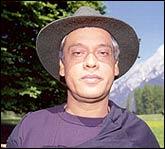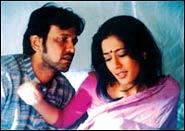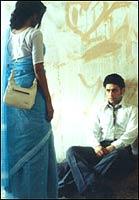 | « Back to article | Print this article |
 Filmmaker Sudhir Mishra has always found critical appreciation, but widespread rave reviews have escaped his usually edgy flicks. Until Hazaaron Khwaishein Aisi, that is.
Filmmaker Sudhir Mishra has always found critical appreciation, but widespread rave reviews have escaped his usually edgy flicks. Until Hazaaron Khwaishein Aisi, that is.
With his latest film being applauded with seeming unanimity, Mishra spoke to Entertainment Correspondent Raja Sen about how the film came to be, while, with characteristic candour, he discusses Indian filmmakers and their failings. Excerpts:
Hazaaron... is a film I wanted to make for a long time. It's, in a sense, a lament for a lost generation. For the generation that was young in the 1970s.
The film takes place between 1969 and 1977. They were a generation just before mine; they were the people I idolised when I grew up. And they were the last idealists in this country. Now, idealism has become a bad word. It was a generation that might effectively have failed, but that attempt, I thought, was interesting.
They were poets, in a sense, and their lives had a kind of poetry, and I thought it was time to tell their children about the lives their fathers led. Because their children are now the youth of today. I would love for mothers and daughters and fathers and sons to watch this film together. So they know about their parents when they were young, when they were in love, when life meant something and change seemed possible. When you didn't always agree. When dissent wasn't a bad word. When you didn't accept the inheritance of the country handed down to you by your parents, and you had your own ideas.
| |||||||||||
It's about when life isn't just about loving your parents, but sometimes also about disagreeing with them. And this was not out of hate, or anger for its own sake, but a general disagreement. So I think it's interesting to look back and talk about that generation now.
I've told my story strictly from a non-ideological point of view -- I'm not with any group, any (political) party, any strict, straight ideology; I'm an absorber, and I see things as they were, and that's what I've tried to tell.
But at the end of the day, it is also a tale. I'm a storyteller. Like an old man sitting under a tree, I'm weaving stories. I think it's a great story. In one sense, it's about a boy who loved a girl all his life. He grew up and became a political fixer, but she was one deal he couldn't fix. In the end when he did get her, he didn't know it. In a sense, it's about a girl who didn't love a boy, but in the end when he needed her as a friend, she was there. It's about a girl who finds herself. It's about a man who accepts his weakness and goes away. It's about people, young people, and how, when life happens, things change.
So I think it's interesting just by itself, as a story. I was impressed when some 20-odd management students who watched the film at the Goa film festival were moved. I was quite relieved that it talks to the young.
In the end, it's a great tale. In the end, it's an emotional, funny tale of growing up, and how it is being young.
My protagonists are three people, two boys and a girl. There's Siddharth (Kaykay Menon), the son of a Delhi upperclass slightly sensitive nice liberal human being, who doesn't agree with his father's namby-pamby socialism or idealism and becomes an extreme Left-leaning radical, and goes away.
There's Geeta (Chitrangada Singh), who loves him; she begins as a camp-follower of Siddharth, but they grow up through college together and things change -- they grow apart, and she goes away to England where she meets another man, gets married, comes back, finds Siddharth again, and starts developing a relationship with him again.
 In the middle of these two is Vikram (Shiny Ahuja), who's a smalltown boy. He's just come to Delhi a and he's not comfortable with his English-speaking side. For him, (being at) St Stephens or the Delhi College of Engineering is about learning manners and the English language and getting ahead. And Geeta touches him at an early point in his life, and he loves her all his life. And she never comes to him. But in the end, their friendship resolves the film.
In the middle of these two is Vikram (Shiny Ahuja), who's a smalltown boy. He's just come to Delhi a and he's not comfortable with his English-speaking side. For him, (being at) St Stephens or the Delhi College of Engineering is about learning manners and the English language and getting ahead. And Geeta touches him at an early point in his life, and he loves her all his life. And she never comes to him. But in the end, their friendship resolves the film.
Hazaaron Khwaishein Aisi is about these three and their interactions. The politics is the backdrop. I don't know if I'd call it a heavy film. If Black is not a heavy film, this is not heavy. It's very funny at times. Vikram, especially, is a very funny character, and all my films always have a black comic edge to them. I'd have to say this is one of my films I really like. I like the others, sure, but this one I really like.
Like Garry Lineker, the great footballer, said, the guy who scores the most goals is the guy who is in the right place all the time; sometimes the ball comes to him. So if you stay in films and keep working at it, sometimes 'the' story comes to you. I'd love for the young people of today to go and see this film, because once you go to see this film, I promise that by the end of it, it'll affect you in some way. It's not a film you'll forget. I promise you that.
Whether you like it or not is irrelevant, but you can't ignore it.
To be very honest, this is one film I've made where I don't give a damn about anybody's opinion. I found my metre in this film, so I don't care. I know when you turn back 30 years, and you'll want to see a film about India as it was, then there's no other film. Because every young filmmaker is making a film in 'DVD land.'
Every filmmaker is not making a film about that India; I'm the only one. I hope it inspires other people to do the same. I'm just confident that this film will remain. So I don't care if people like it, don't like it -- I would love for them to see it.
I'd like to even organise free screenings for people so they can see it. I'd love for people to just react and talk. That's what I'd like to do with this film, actually.
I think Anurag Kashyap is a very good filmmaker. I think among the younger filmmakers, he's one of the few who has an opinion, has an attitude, has a point of view, and is original. I think Ashutosh Gowariker has great potential as a filmmaker, and someday he will find a film which will be outstanding.
 I'm a fan of Ketan Mehta. His Bhavni Bhavai is one of the reasons I came to cinema. I saw it and realised this was something I needed to do. So I'm very pleased that he's making a film again. And I feel, in some way, responsible for it, because I've been after his a** for the last five-six years to get up, so I'm pleased that he's making a film (The Rising).
I'm a fan of Ketan Mehta. His Bhavni Bhavai is one of the reasons I came to cinema. I saw it and realised this was something I needed to do. So I'm very pleased that he's making a film again. And I feel, in some way, responsible for it, because I've been after his a** for the last five-six years to get up, so I'm pleased that he's making a film (The Rising).
I regret that Shekhar Kapur doesn't make films more often. Because he's one filmmaker I admire. The problem is that he admires himself so much he doesn't make films more often.
But he's outstanding. There are very few people who handle the camera and internalise it so well. The place comes alive in his film and the time comes alive. His films have a personality. Very few Indian films have personality.
I think it's time for Vidhu Vinod Chopra to make a very, very good film. I don't know where he lost sight of the fact that he was India's original, pioneering thriller maker. Khamosh was the first whodunit, and very well done.
I like (Madhur Bhandarkar's) Page 3. I mean, it is a tacky film, but at least it's normal, and the people are real, and relatable.
What do I think about Black? I don't like hamming in films, and it's a film where everybody's hamming, including the cameraman. Everything is setup for effect -- 'look how sensitive I am.'
It's not really a film about the girl who's blind. It's like you make a film about a guy who's lame, then you take the crutches away, then you hit him on the head, and he falls and you point and say, 'look how he's suffering.' When everything is for effect, it becomes boring. As a filmmaker, you start predicting.
For me, it's a very manipulative film. It's always manipulating me to cry. It's asking for too much sympathy, and I don't have that much sympathy to give. It's like emotional blackmail all the time, and I find that very unattractive. Some people might really like it, but it's not for me.
 I think (Sanjay Leela) Bhansali is a good filmmaker; he's a person who's trying to tell a story visually. So he is a guy to watch out for. Like when he told stories which are musical in a way, in a milieu that he knew, like in Hum Dil De Chuke Sanam -- it's a film that works where it is.
I think (Sanjay Leela) Bhansali is a good filmmaker; he's a person who's trying to tell a story visually. So he is a guy to watch out for. Like when he told stories which are musical in a way, in a milieu that he knew, like in Hum Dil De Chuke Sanam -- it's a film that works where it is.
Why are we even talking about Black? Well, because we're reacting to the fact that they brought out ads saying this was the best film ever, and some critics said this was like (Polish director Krzysztof) Kieslowski. And since all of us somewhat like Kieslowski (laughs) and have grown up on Red and Dekalog, we feel its our duty to say, 'Hey, wait a minute.' And set the record straight.
What I hate now is that everybody's become a fascist. And dissent has gone out the window. It's not important whether I like Black or not, it is a personal opinion. Suddenly the whole 'how do you dare not like it?' backlash it's ridiculous. I mean, come on, if you don't like my film, do I say anything?